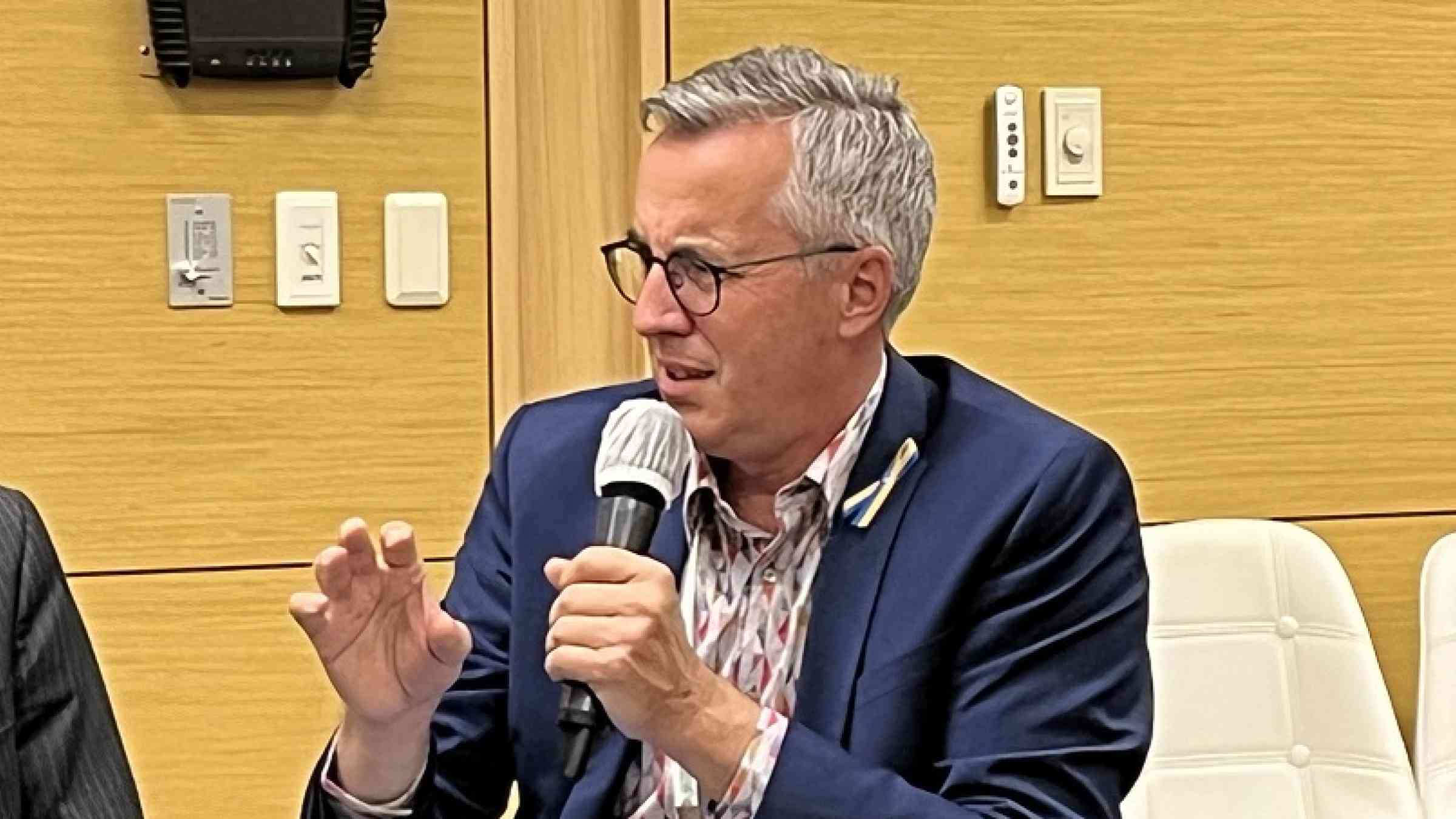
‘We learnt that climate change is very, very expensive’. This was the candid reflection of the Deputy Mayor of Cologne, Germany, Mr Andreas Wolters (pictured above) as he recalled the havoc of severe flooding in his city 16 months ago.
‘We had no water for 8 days, no electricity for 10 days; shops, banks and petrol stations remained closed for 4 weeks,’ said Mr Wolters before outlining how his city has moved to use this experience as a springboard to greater ambition and action on disaster resilience. The Deputy Mayor said Cologne was looking to develop more ‘green solutions’ to reduce its flood risk. This included increasing ‘sponge city areas’ to mitigate the impacts of localized heavy rains. ‘You cannot protect a city only with infrastructure,’ he noted.
Mr Wolters was speaking as part of the ‘Future of Resilience: From Early Action to Reduced Vulnerabilities’ session at the United Cities and Local Governments (UCLG) World Congress, in Daejeon, Korea. The session, organized by the Making Cities Resilient 2030 (MCR2030) global collaboration of local governments and partners, heard from several municipality leaders and officials.
Deputy Director of Incheon, Korea, Ms An Sung-Ah outlined how her city’s comprehensive and integrated heatwave management plan focuses on protecting the most exposed and vulnerable communities. The Mayor of Ramallah, State of Palestine, Mr Issa Kassis, explained how his city’s accumulated experience of various disasters enabled a more effective response and recovery from the COVID-19 pandemic.
The Mayor of Tanauan City, Philippines, Mr Nelson Collantes, highlighted the importance of effective partnerships that provides local governments with knowledge and tools to protect lives and livelihoods. The Mayor of Esteban Echevarria, Argentina, Mr Fernando Gray, noted that disaster resilience was both a challenge and opportunity that required constant learning and a greater focus on adaptation.
The session took place on the International Day for Disaster Risk Reduction and picked up the theme of early warning and early action (Sendai Framework Target G) as an investment and not a cost. ‘That is why I am calling for universal early warning coverage in the next five years,’ said the United Nations Secretary-General Mr Antonio Guterres in a video address.
The Special Representative of the United Nations Secretary General for Disaster Risk Reduction, Ms. Mami Mizutori said the current lack of coverage was ‘unacceptable’. ‘We can, and we must, stop hazards from becoming disasters, and put the world on the path to Zero Climate Disasters,’ Ms Mizutori said in her video statement.
The ‘Future of Resilience: From Early Action to Reduced Vulnerabilities’ session also heard from Ms Olga Dzhumaeva, Head of East Asia for the International Federation of Red Cross Red Crescent Societies and Dr Alexandre Frediani, Principal Researcher at the International Institute for Environment and Development and partner of the Tomorrow’s Cities Hub.
As the world approaches the halfway point of the Sendai Framework and the overall 2030 Agenda for Sustainable Development, implementation is lagging in several key areas. Scaled up ambition and action at the sub-national level is critical to transform progress. As part of this effort, MCR2030 core partners UNDRR and UCLG organized an interactive training at the World Congress titled ‘The Cost of Doing Nothing – Scenarios for Investing in Resilience’. The session highlighted the importance of local and regional governments taking a long-term and systematic approach to resilience. It engaged the 15 representatives from local government and academia in a game called Futurities that demonstrated the impact of today’s decisions on tomorrow’s resilience.
MCR2030 is a United Nations-convened global network that has mobilized 1,388 local governments, representing almost 387 million people. The partnership has convened national governments, municipality associations, service providers, as well as 12 core partners that are a ‘who’s who’ of international organizations active on urban resilience.

